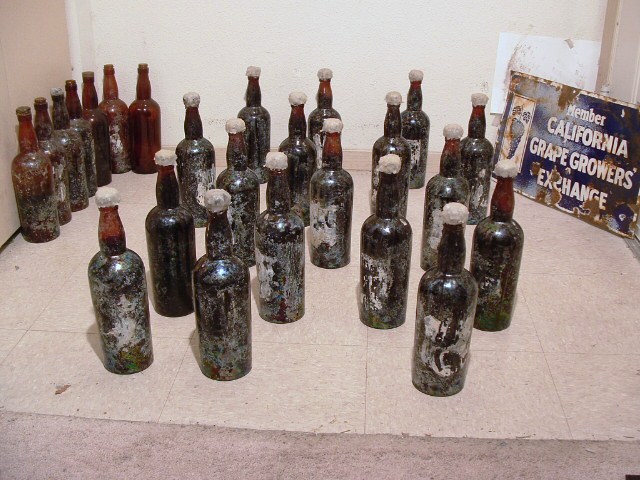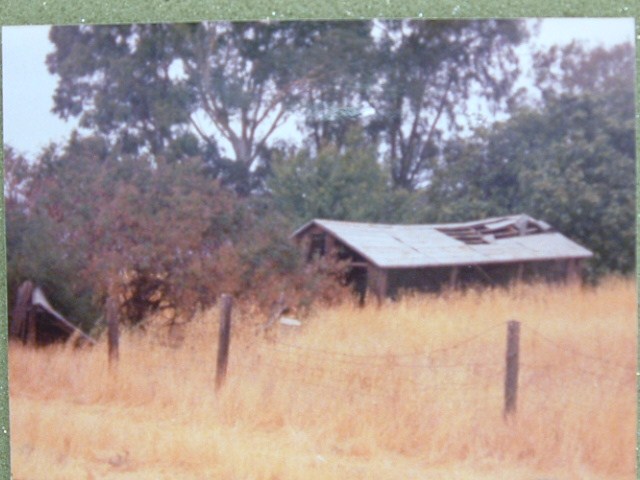|
This rare wine was recovered from the underground wine fermentation cellar of Fred Schoeler Vinyards which he closed and buried in 1936, after the repeal of prohibition laws by the federal government. The site was excavated by Gilbert Gonzalez in 1993, with permission of Robert Kessler heir to the site. Twenty four bottles were recovered, nineteen were still sealed, of this rare Zinfandel wine.
| Zinfandel Wine 1935 |
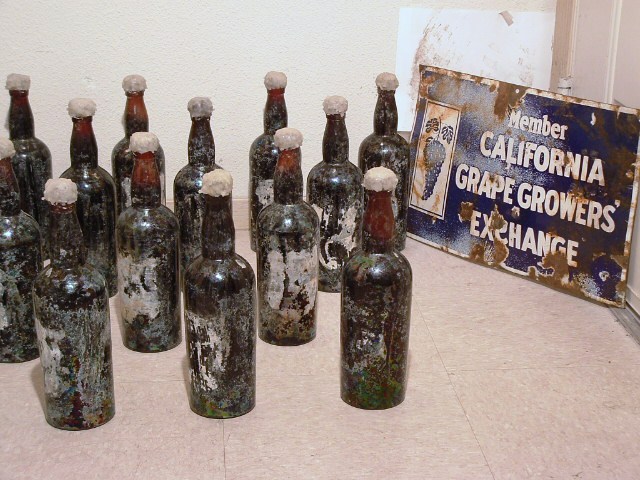 |
| Zinfandel Wine 1935 |
One bottle was given to Robert Kessler, and one bottle was taken to the R.H. Philips winery north of Esparto. Where it was opened and tested, it was still wine. Taste test; the taste of alcohol, grape, a slight charcoal and sulfur is present from the fermentation processes of the time period. Upon tasting the old wine, Robert Kessler said, "That's what the wine they made in 1935 tasted like". Because they would put sulfur in the barrels to purify them and then charred the inside of the barrels with hot charcoals and then rinse the barrels with water before the ferment process started. Hence, a very slight charcoal and sulfur essence can be tasted when you try it.
| Zinfandel Wine 1935 |
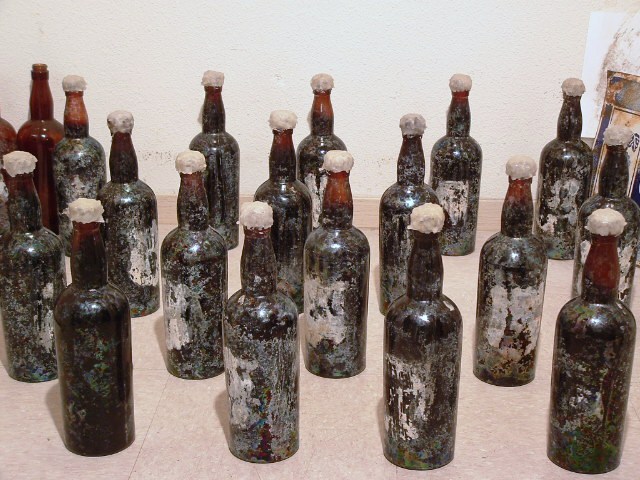 |
| Zinfandel Wine 1935 |
The family's verbal history, the excavation site, the twenty four bottles recovered and the enamel sign are the few remains of Schoeler's vineyard and prohibition era winery. As of this date 17 bottles of this old Zinfandel remain unopened. Waiting for some great occassion.... or a large offer that I cannot refuse, something this unique and historical should be valued at, what ever two people can decide on. Enough so I could buy a house in the mountains. Wine experts would probably have a different value, if it were in their hands. Rare time capsules like this are priceless and are true history. An old map of Yolo County, year 1900, shows the property owned by Fred Schoeler where the vineyard once thrived. This old map has it's own history, it was found in the cellar of a homestead that burned many years ago and was purchased by Helena Rominger who's husband found this map in the burnt ruins of the cellar of that homestead. Which was located about four miles southeast of the Schoeler vineyard. She kept this map for many years in her wood shed/wash house, she past it to me many years ago for services rendered and being a good friend to her. She out lived all her friends and all but one of her children, a daughter, Helen. Though it has much physical damage , it is still a great old map. It is five feet high and six feet wide a great wall map from the year 1900.
| Yolo County Map 1900 |
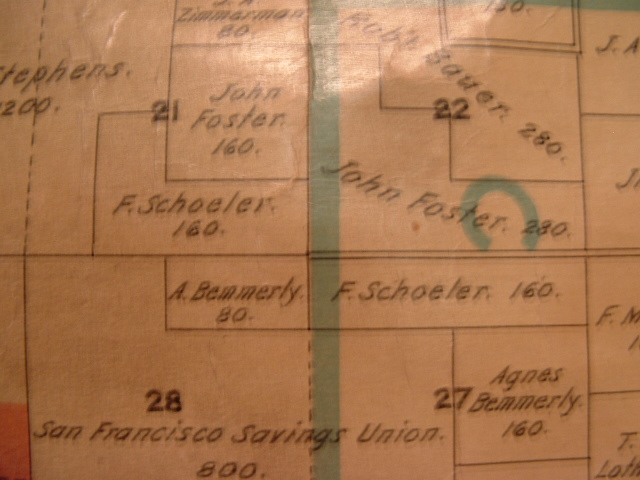 |
| Yolo County Map 1900 |
The Schoeler land lies along Goodnow Slough, a deep ravine that cuts through soft aluvial soil
| Yolo County Map 1900 |
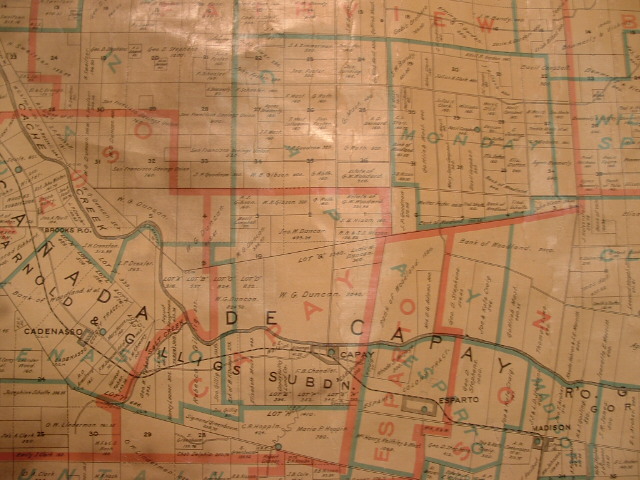 |
| Yolo County Map 1900 |
| Yolo County Map 1900 |
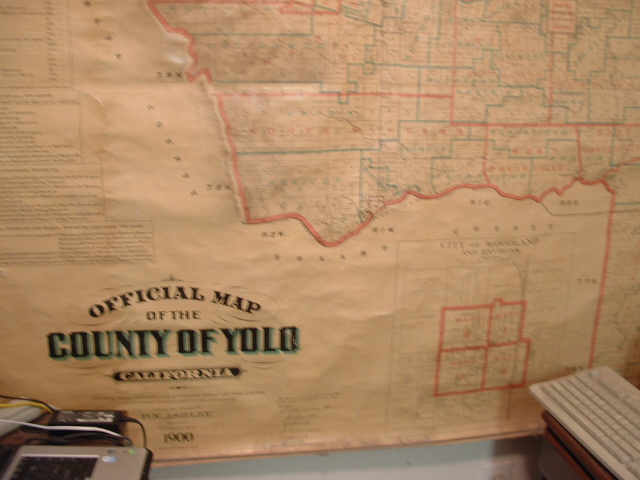 |
| Yolo County Map 1900 |
| Schoeler Vinyard |
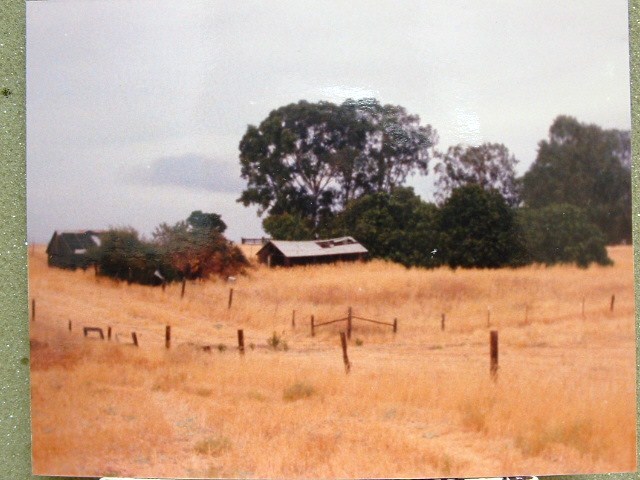 |
| Schoeler Vinyard |
Rare wine from the Schoeler vinyard , Yolo County , California . I enjoy finding old stuff, or I should say ,,, old stuff just finds me.
.................
The following is the account of the discovery of this very old historical zinfandel wine. This adventure was first published in the Sacramento Mineral Society's
"Matrix Newsletter" as Episode four , of the Yolo Rock Chronicles
................
xxxxxxxxxxxxxxxxxxxxxxxxxxxxxxxxxxxxxxxxxxxxxxxxxxxxxxxxxxxxxxxxxx
Yolo County Rock Chronicles
Episode four; Rock hound spirits
Finding beautiful rocks and incredible mineral specimens is part of the adventure of rock hounding. It is a treasure hunt, the value of what you find is, in the hands of the beholder. I have found many man made artifacts while searching for petrified wood in western Yolo County.
One special spring day in 1993, I was headed home after spending a few successful hours collecting some outstanding pieces of Yolo County petrified wood on old Bob Kessler's section of Goodnow Slough. As I approached the main livestock gate of my sheep ranch, I saw my neighbor, ole Bob Kessler working on the windmill that pumped water for his thirsty white face cattle. There was no wind that day, so he was attaching a pumpjack to the well head and would power it with a gasoline motor. Nearby was his water storage tank which could hold about five thousand gallons of precious water. The tank rested on a wood platform supported by twelve concrete block collumns, each one about six feet high.
| Schoeler Vinyard |
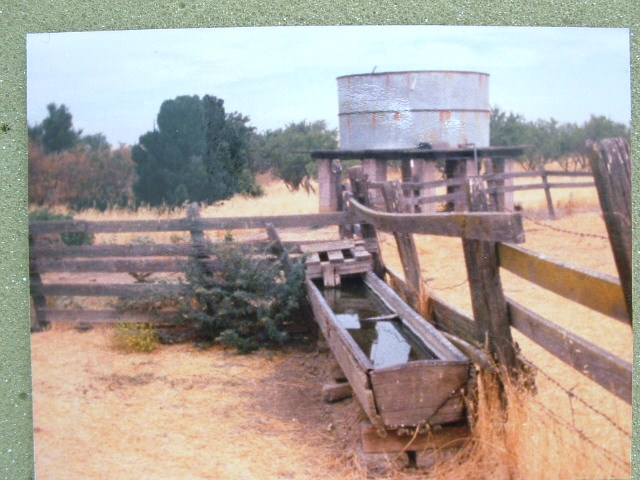 |
| Schoeler Vinyard |
All around the area were the rustic remains of the original Schoeler homestead. Fred Schoeler, ole Bob's uncle, had built a classic California homestead here in the early 1900's. About one hundred ancient eucalyptus trees form a huge windbreak along the entire northern boundry of the site. To the east are about forty very old almond trees, a grove of enormous elderberry bushes, a couple of date palms and numerous golden fig trees. The crumbling concrete foundation of a once stately two story farm house with a deep basement and screen porches all around, is near the eucalyptus trees. To the west was a chicken house and chicken pens also an old tool shed and large bunk house for seasonal workers. To the south of these old relics were the concrete foundations of three long forgotten hay barns, once the center of activity on the farm. A wild land fire had swept through here in the past and left mostly ashes. Over to the south-east are the remains of the dairy shed and a fenced five acre dairy cow pasture. Towards the west was a series of cattle correls and holding pens used by Bob to work with his cattle.
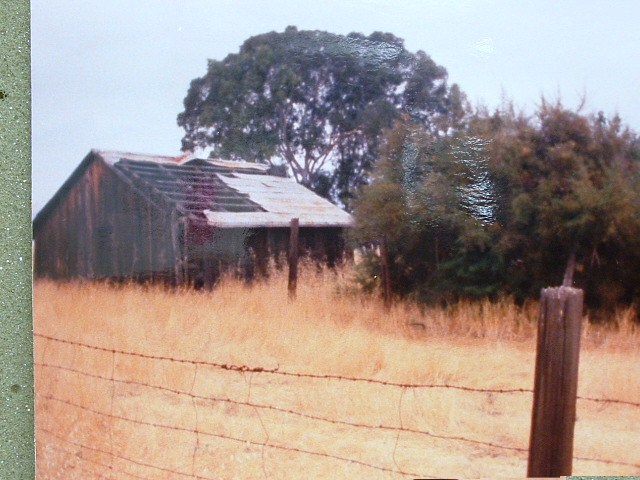
In the center of the homestead was the well and windmill and the charred remains of a huge water tank house that had also burned long ago. I asked Bob if he had any old photographs of his uncle's homestead in it's hay day when it was alive with people and all the buildings were here. Well he said "no", but he proceeded to tell me what it was like when he worked for his uncle as a teenager. Original it was a dryland vineyard of about one hundred and sixty acres of mostly zinfandel grapes, five hundred acres in dryland barley and wheat, and two hundred acres of blue oak forest rangeland. There were three hand dug wells each about one hundred feet deep with windmills for pumping.
When prohibition of alcohol happened in the 1920's the local wineries shut down and there was nowhere for Fred Schoeler to sell his grape crop. So he created two large underground wine making cellars, one under the dairy shed and one near the main house. Each eight feet deep and well hidden. The Schoeler winery flourished during prohibition, supplying much needed zinfandel wine to the citizens of the San Francisco bay area.
| California Grape Growers Exchange |
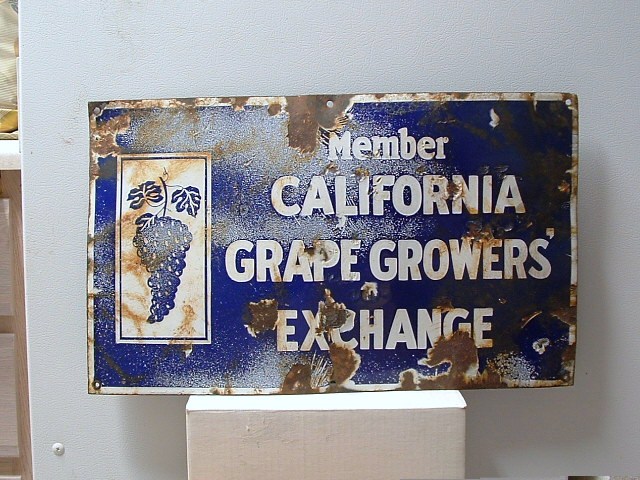 |
| California Grape Growers Exchange |
The prohibition ended and the price of wine fell as fine wine was now legal to be produced on a large scale and imported by the cargo ship load. So in 1936 Fred Schoeler decided to close the winery and concentrate on grain farming and cattle ranching. Before the wine cellar near the house was filled in, Bob helped his uncle Fred place two cases of their finest zinfandel wine in the very bottom of the cellar, then it was covered with eight feet of earth. A time capsule, to rest for fifty years. Ole Bob Kessler inherited the homestead and waited until 1985 to attempt to recover those two cases of zinfandel wine. He dug three deep holes where he thought the wine was located, but found nothing. He was so disappointed, he didn't bother to fill in the holes he had dug, they are still there. Three huge craters, each about 15 feet across and very deep.
| Zinfandel Wine 1935 |
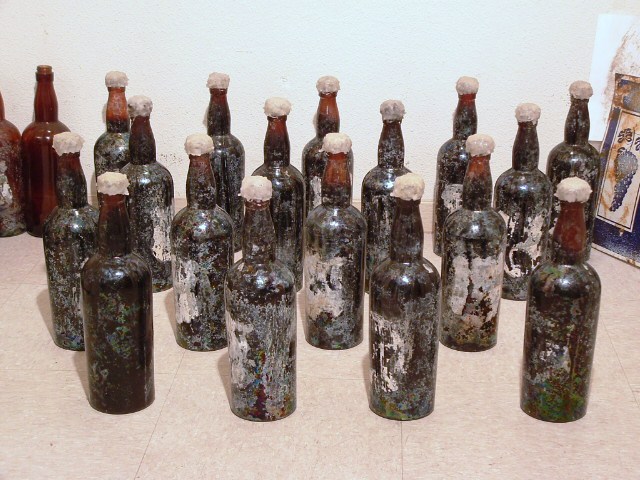 |
| 1935 Zinfandel Wine |
I told Bob, "since it was liquid, maybe I could find it with my bronze water witching rods". He said "try it". So Iwalked over to my ole rusty 4x4 Chevy and grabed my well worn witching rods and proceeded to scan the areas where Bob had not dug craters. At a spot between the old house foundation and the nearest crater, my witching rods gave me a slight but definite signal. I told Bob that I thought this was the spot, but he said " no, that spot is too close to the house and it was not there, but if I wanted to dig there, go ahead".
The next day I returned with a pick, shovel, water and a chisel bar. The ground was hard, they call it red gravel soil, after the winter rains it dries to half the hardness of concrete. Each swing of my old weathered pick only chips off a one inch deep piece of earth. Progress was slow, the first twelve inches took forever to dig, but it was only the top twelve inches of soil that had hardened to form a hard crust. Below this hard dirt was fine sandy fill dirt that Fred Schoeler had filled the cellar with and it was so easy to dig. I was soon down about six feet when I heard the clink of glass. Using my leather gloves I carefully began to remove the sand and exposed the tops of twenty four wine bottles.
| Zinfandel Wine 1935 |
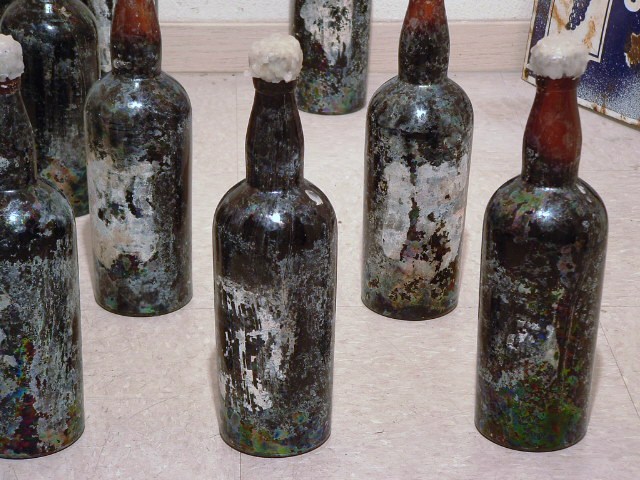 |
| Zinfandel Wine 1935 |
As I was removing sand I heard a vehicle approaching on the gravel road. It was my friend Roger and his beautiful lady Pamala. I asked if they wanted to help me dig up this old wine treasure, they did. The three of us proceeded to slowly remove the bottles from this deep hole, nineteen bottles were perfectly preserved and still sealed with wine inside. Five bottles had lost their seal were only half full. Those amber wine bottles were 950 ml with cork lined metal caps, the cardboard boxes and any labels had long ago disappeared to nature. We celebrated with some ice cold beer that Roger had in a ice chest. It was Easter Sunday and what a good Easter hunt that day was.
Bob Kessler was happy that I had found the wine and asked for just one of the good bottles, which I gave him. The remaining bottles I took to the R.H. Philips winery, located just north of Esparto and talked to one of the owners Carl Giguire . I showed him the bottles and he took me to see his head winemaker. With much difficulty and care the wine master was able to remove the metal cap that time had welded to the glass. He slowly poured some into a decanter and did a few tests on the sample, then declared that it was still wine. Fifty eight year old zinfandel, (that was in 1993), today in 2011 this zinfandel is seventy six years old. We all got to taste that well aged brew from the gangster days, and what a taste. The flavor of the wine is proof of it's age, the taste of alcohol, grape, charcoal and sulfur is evidence that is consistent with wine making practices of this time period. At that time the inside of the oak wine barrels were charred with hot coals and treated with sulfur powder to prepare them for the fermentation process. The resulting wine carried a slight charcoal and sulfur taste. The inside of the bottles were stained by the color of the wine, except for the small area at the top, the wine is now a pale pink color.
| Zinfandel Wine 1935 |
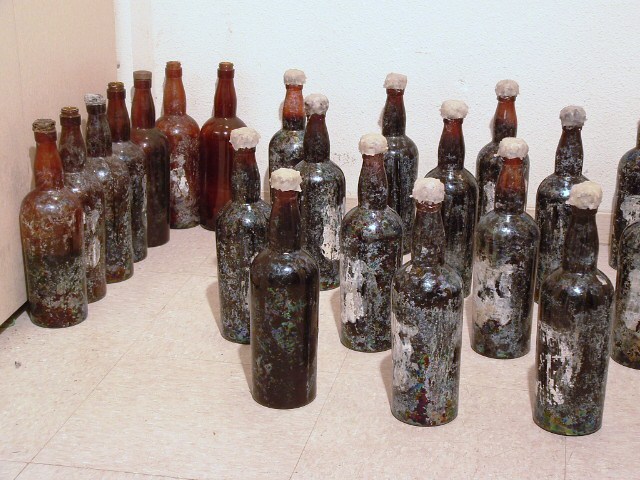 |
| Zinfandel Wine 1935 |
I took six bottles of this old zinfandel wine to the University of California at Davis wine department to ask of it's historical value. I got to see their head wine maker and he was kind enough to check over the bottles. He told me that the bottles had all indications of being very old wine, mostly because of the staining on the inside of the bottles. But since the bottles have no labels and there is no official documentation that a winery existed in Yolo County during prohibition, they have no verifiable history, if compared to documented old wine. He said the best thing to do was to donate the remaining seventeen bottles to the university, where they would do documented research and analysis on this rare wine. I said " have a nice day". He also suggested that I seal the tops of the bottles with hot wax to help maintain the seal of these old caps, so I did and they are still sealed... I returned my six bottles to my cellar and placed them with the others. The remaining seventeen bottles, the empty seven bottles and the enamel sign are still together in my cellar.
| Zinfandel Wine 1935 |
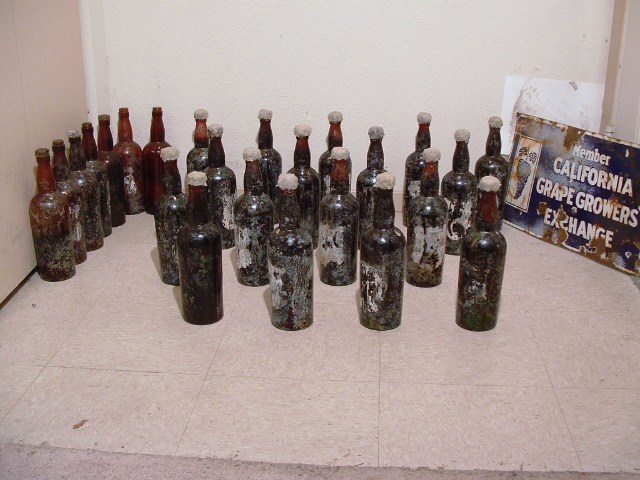 |
| Zinfandel Wine 1935 |
xxxxxxxxxxxxxxxxxxxxxxxxxxxxxxxxxxxxxxxxxxxxxxxxxxxxxxxxxxxxxxxxxxxxxxxxxxxxxx
Enter subhead content here
xcxcxcxcbbbbb
|
Natural Gold Nuggets * Tuolumne Sunshine Mine * Tuolumne County * California * US *
|
|
 ROCK HOUND SPIRITS
ROCK HOUND SPIRITS